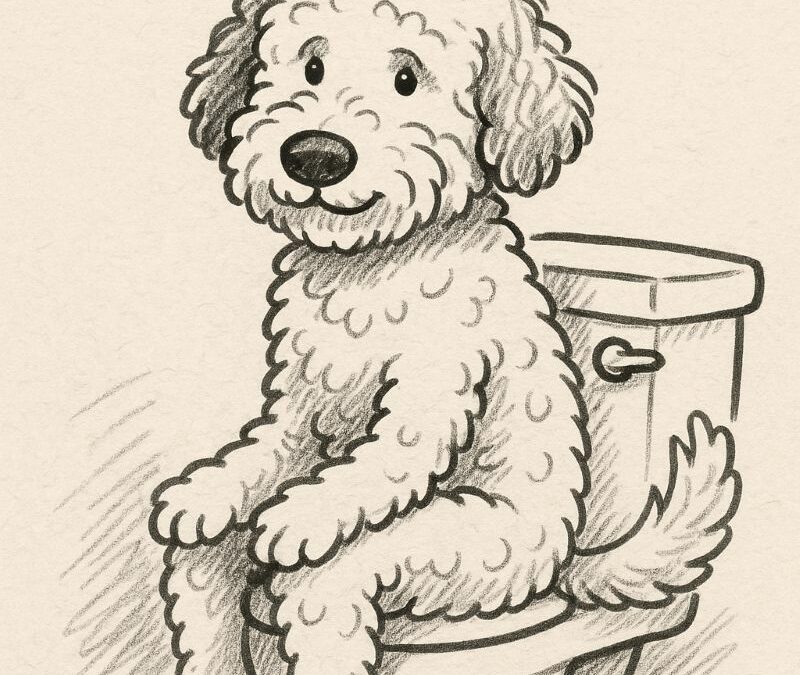No pet parent ever wants to talk about poop—and yet here we all are. Diarrhea happens. Sometimes it’s because your dog snarfed up a forgotten French fry in the parking lot. Sometimes it’s because you tried a new dog food that seemed like a good idea at the time. And sometimes…their gut just decides to go absolutely rogue and ruin your afternoon. Whatever the cause, here’s how to handle it at home—and when it’s time to call your veterinarian for help.
When the dog has diarrhea
Loose stools aren’t a diagnosis. They’re a symptom.
It could be:
- they ate something weird (hello, sock-eating Lab)
- too much fatty food
- rapid diet change
- stress (new environment, thunderstorms)
- bacteria, viruses, parasites
The key point: every case is different. Some dogs rebound quickly. Others require a little more detective work…
The first step is fasting for 8-12 hours if your dog is otherwise healthy and not taking medications. Of course, fresh water should always be available.
“For many dogs with a mild case of diarrhea, withholding solid food for several hours to one day—followed by introducing a bland diet—can help the gut recover and reset. However, if you have a puppy, a senior dog, or a dog that is taking medications or has a medical condition, fasting is not recommended, and you should contact your veterinarian,” says Dr. Laura Weis, veterinarian and co-owner of Green Acres Pet Resort along with her husband Dr. Randy Weis.
The next step is serving a bland diet. Keep the meal simple—and no seasonings.
Favorable bland protein options:
- plain boiled chicken
- plain boiled turkey
Pair whichever protein your dog tolerates with a simple carb:
- white rice (most common and easiest)
- cooked barley (if rice isn’t tolerated)
Add in gentle fiber:
- plain canned pumpkin (NOT pumpkin pie filling)
- cooked/mashed sweet potato
Feed small meals several times a day.
Think toddler-sized portions—not a Thanksgiving-sized plate. This gives the gut a chance to settle instead of continuing the chaos.
“Diarrhea is common in dogs, but every case deserves individual attention. Don’t hesitate to call your veterinarian—early support often prevents bigger issues later,” adds Dr. Laura Weis.
When should you call your veterinary office?
Trust your instincts. If your dog feels “off,” there’s no harm in calling. Your veterinary office would rather answer questions early than wait until things become an emergency. If you notice any of these signs, you should call your veterinarian:
- diarrhea lasts more than 24 – 48 hours
- your dog is lethargic or not wanting food
- diarrhea contains blood or looks black/tarry
- vomiting is happening too
- your dog is a puppy or senior (their safety margin is smaller)
Digestive upset away from home.
New environments can stir up big feelings—and sometimes big tummy troubles—in dogs. Sometimes, whether they’re enjoying a fun day of play in daycare or staying overnight at the resort, a change in routine can cause temporary digestive upset. At Green Acres Pet Resort, stress is minimized by providing familiar comforts like personalized attention, calm social groupings, plenty of purposeful activity, and food from home when possible. But even with all that support, a sensitive gut can still get a little out of balance.
“When your dog stays or plays at Green Acres Pet Resort, our staff is trained to keep a close eye on digestive health. If their gut seems unhappy—our staff will communicate with you immediately,” says Dr. Laura Weis.
There is no one-size-fits-all diarrhea protocol. Some dogs bounce right back with bland meals and time, and others might need more attention. Either way, speaking with your veterinarian and pet care staff is the best way to help your dog feel better sooner.


